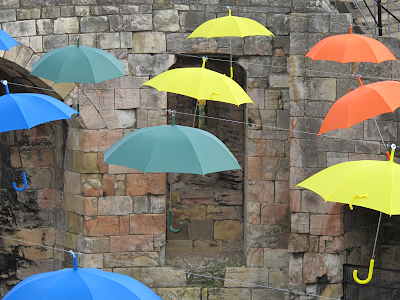When Paul wrote his letter to Philemon he was appealing to him as a fellow believer on behalf of a runaway slave. I've just read Steve Addison's take on this in chapter 16 of his book, 'What Jesus Started'.
The book is an excellent read, by the way. I'd recommend it to anyone wanting an introduction to life in Israel and the Greco-Roman world of the first century.
Steve describes the life of Jesus and the disciples, and the beginnings of church as the early believers were scattered. He also covers the life and work of Saul (Paul to the Greeks) and how this continues in us, today. He brings it all to life and makes it seem very real. It's both interesting and challenging; it's an accessible glimpse into the lives of real people lived two thousand years ago.
Here's a brief extract...
Paul spent about a quarter of his ministry under arrest. On one occasion Paul was under house arrest, probably in Rome awaiting trial, when a runaway slave came looking for him.
Onesimus was a slave in the household of Philemon, a friend of Paul's. Onesimus must have known something of the gospel, as Philemon was a Christian in whose home the church gathered. Onesimus had fled after he wronged his master in some way. Under Roman law a master had the right to hunt down and brutally punish an escaped slave, and anyone harboring an escaped slave was liable to pay the owner for compensation. Onesimus may have hoped Paul would mediate between him and his master.
Through Paul, Onesimus became a believer. Paul loved him as a father loves his son and came to rely on his help during his imprisonment. Paul wanted to reconcile Philemon and Onesimus, so Paul wrote a short note for Onesimus to take back to Philemon.
The letter to Philemon gives us an idea of how Paul trained disciples to follow Christ in a world corrupted by sin. Paul wanted Philemon to see how Christ could transform his social relationships. Onesimus was still a slave under the law, but he should no longer be treated as one because he was now a brother in Christ. Paul reminded Philemon that both slaves and masters are servants of Christ and members of the one household of faith. Philemon, Onesimus's master, himself had a master in heaven. Paul could have ordered Philemon to act in a particular way; instead he appealed to the truth of the gospel and its implications for how Philemon should treat a brother in Christ who happened to be a slave.
Paul offered to repay any wrong Onesimus had done, but because Philemon had found Christ through Paul, he owed Paul a greater debt than Onesimus owed him.
The shortest letter Paul wrote, Philemon is a window into how Paul trained disciples. Both Philemon and Onesimus came to know Christ through Paul. Having shared the gospel of God's grace with them, Paul was now, from prison, teaching them to live out the gospel's implications. He was not laying down a new law; he was teaching disciples to follow Christ.
Let's look again at the points Steve makes here; they are essential for our lives in Christ as believers and followers. Further into the chapter, Steve explains that Paul regularly uses the same structure in his letters and in his recorded conversations in Acts.
He begins by setting out the basic truth of the gospel and then, using that as a launchpad, he appeals to people to have attitudes and lives that are modelled on that gospel and on Jesus himself. So all of the things that the Bible teaches us about grace and forgiveness, love, caring for the weak and the sick, generosity, holiness and all the rest, all of the things expressed in the life of Jesus, these things become challenges to us to live and think the same way.
He does it here twice in this very short letter. He has evidently persuaded Onesimus to return with the letter, showing by his own life and imprisonment that obedience to Jesus is necessary regardless of the cost. In the same way, Onesimus should show obedience to Philemon.
Paul opens his letter by mentioning Philemon's love for all the believers. His appeal is based on the love that Jesus showed, paying our great debt and forgiving us out of his pure love for the lost. In Christ we are all sinners rescued by grace because of love and Philemon should continue to imitate Jesus in this.
But above all, Paul shows us that we should be especially slow to judge one another, slow to criticise, and avoid telling one another how to behave. Instead we should ourselves behave in ways that are full of love and grace and are worthy of following; then we will demonstrate the way to others just as Paul himself did, and just as Jesus did.
Questions:
- Do you know people who are imitators of Christ?
- What advantages do you see to modelling Jesus in your daily life? (First for yourself, then for those who watch you.)
- There's an old proverb, 'Actions speak louder than words'. Is it true? Why, or why not?
See also:
- Movements that change the world
- Philemon - Bible gateway
- Steve Addison - Movements that change the world
- What Jesus started - Amazon


















